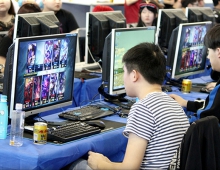
Online gamer killed for selling virtual weapon
A Shanghai online game player has stabbed to death a competitor who sold his cyber-sword, the China Daily said.
The incident creates a dilemma in China where no law exists for the ownership of virtual weapons.
Qiu Chengwei, 41, stabbed competitor Zhu Caoyuan repeatedly in the chest after he was told Zhu had sold his "dragon sabre", used in the popular online game Legend of Mir 3, the newspaper said a Shanghai court was told yesterday.
Legend of Mir 3 features heroes and villains, sorcerers and warriors, many of whom wield enormous swords.
Qiu and a friend jointly won their weapon last February, and lent it to Zhu who then sold it for 7,200 yuan ($A1,129), the newspaper said.
Qui went to the police to report the "theft" but was told the weapon was not real property protected by law.
"Zhu promised to hand over the cash but an angry Qui lost patience and attacked Zhu at his home, stabbing him in the left chest with great force and killing him," the court was told.
More online gamers were seeking justice through the courts over stolen weapons and credits, the newspaper said.
"The armour and swords in games should be deemed as private property as players have to spend money and time for them," Wang Zongyu, an associate law professor at Beijing's Renmin University of China, was quoted as saying.
Other experts called for caution. "The 'assets' of one player could mean nothing to others as they are by nature just data created by game providers," a lawyer for a Shanghai-based internet game company was quoted as saying.
Virtual gaming is fast becoming a very popular worldwide trend. Games such as Legend of Mir 3 are known as "massively multi-player online role-playing games" (or MMORPGs).
The worlds created in them are incredibly detailed, and can develop and change even when players are off line.
They have attracted an enormous amount of subscribers and, according to a report in the Australian Financial Review, gamers are attracted to them because they have overcome the biggest problem in traditional computer games: loneliness.
Games writer Jason Hill said that while MMORPGs make up only a tiny percentage of the virtual gaming market, those who do play them tend to be very dedicated, spending a lot of time in these cyber-worlds.
"The actual items in the games, be they property or tools, become valuable because of the time people have spent building them up," he said.
"In a lot of games people might have to forage for the raw materials and then take them to a smelter [if they were making a sword or sabre, for example], otherwise the item might be a reward for completing a difficult quest.
"All of that means the item will be difficult to get, and the popularity of these games among certain groups means that these items then become very valuable."
Legend of Mir 3 has not yet been released in Australia. MMORPG enthusiasts here are more likely to be playing the very popular Everquest, or a new contender, World of Warcraft.
"These two are both fantasy games, with a niche appeal, but when people get into it they really get into it," Jason Hill explained.
The case of Qiu Chengwei and Zhu Caoyuan follows a report in the Australian Financial Review over the Christmas break, which told how 22-year-old University of Sydney graduate, David Storey, bought a virtual island - for $35,000 - on December 14 last year.
The island included an abandoned castle, some beautiful beaches ready for development and the potential for the development of lucrative hunting and mining industries. However, it only exists in cyberspace, inside a multi-player computer game called Project Entropia.
Now that Storey owns the island, if any other players visit it for a spot of hunting or a bit of a mine, he is entitled to a percentage of their takings. Every month, for the next twelve months, he can sell five plots of land on his island, which could net him as much as $40,000.
From Sydney Morning Herald/Reuters





















